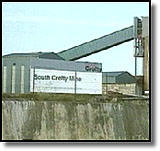
|
Britain's Last Tin Mine to ShutThe last tin mine in Britain, South Crofty, near Redruth, Cornwall, is to shut with the loss of 270 jobs, ending 2,500 years of tin mining in the county.Managers blamed the closure on the falling price of tin on the world markets and the strong value of the pound against the dollar. South Crofty will be closed down over the next six months. The closure announcement marks the end of a battle to save the mine. In 1994, 1,500 small investors, including the miners themselves, offered to buy £500,000 of shares in a £1 million effort to preserve the mining tradition in Cornwall. At the same time, the mine was taken over by the Crew Group of companies, a Canadian resource group. Since the group's involvement, the mine has received cash injections of about £6.3 million. A company spokesman said: "During the past three years a very dedicated workforce has helped improve productivity and decrease production costs at the mine."
But the falling price and rising pound had combined to reduce revenues per tonne by about 27% in the past 15 months. He said the price had fallen to £3,200 a tonne -- way below the £4,000-a-tonne needed to keep the mine open. Until 1870, Cornwall and Malaya monopolized the production of tin. At the industry's peak in the 19th century, there were 400 mines in Cornwall, employing 30,000 people. But the county's dominance was hit by the discovery of tin in Australia. The tin price collapsed in 1985, forcing the closure of mines across Europe. The situation was made worse by the development of the aluminium can. The world market remains stable , in particular for cans and as a chemical in industrial process. Modern production is concentrated largely in Thailand, Malaysia, Indonesia and Brazil.
|
Diana, Princess of Wales, 1961-1997
Conference 97
Devolution
The Archive
News |
Issues |
Background |
Parties |
Analysis |
TV/Radio/Web
Interactive |
Forum |
Live |
About This Site
News |
Issues |
Background |
Parties |
Analysis |
TV/Radio/Web
Interactive |
Forum |
Live |
About This Site
© BBC 1997 |
politics97@bbc.co.uk |

